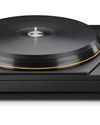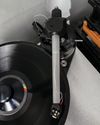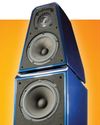
Has it ever crossed your mind that the reason you like your system more than your friend’s or the store’s is not because yours is better, even if you think it is, but because you’re used to the sound of yours and not of theirs? Welcome to product habituation.
Some people, including some audiophiles, believe that product habituation is what’s really behind what some people refer to as product break-in. It’s not a mechanical or electronic phenomenon, they contend, but a mental one. Assuming the sound of the new gear is of adequate quality, it’s the listener that breaks in to the product, as the product’s sound, which was initially strange, grows more familiar and, so, right.
Those who believe in break-in view the process as a period during which a component’s signal-carrying parts are “settling,” the concomitant effect of which is a gradual improvement in sound quality, until whammy! Everything has seemingly, finally, coalesced into a relaxed, cohesive, enjoyable presentation.
Except that’s not what really happens, according to the habituation theory. That whammy? That wasn’t the sound blossoming into a beautiful swan (song?), it was, rather, the moment your brain completely bought the illusion—an illusion that had been there all along.
I’m a compromiser. I’ll venture that both things are happening— that habituation accounts for about half the break-in story. While humans may be the most adaptive species on Earth, it’s jarring when something new replaces something we’re used to. It knocks us out of familiar territory, forcing us to question what we thought we knew and what this new, intrusive thing is all about.
This story is from the October 2022 edition of Stereophile.
Start your 7-day Magzter GOLD free trial to access thousands of curated premium stories, and 9,000+ magazines and newspapers.
Already a subscriber ? Sign In
This story is from the October 2022 edition of Stereophile.
Start your 7-day Magzter GOLD free trial to access thousands of curated premium stories, and 9,000+ magazines and newspapers.
Already a subscriber? Sign In

Michael Des Barres and the Art of Aural Obsession
Listening to music inspires us to take action. Upon hearing an I.E.-Instant Earworm-we must then determine the best way we can go about listening to it again (and again) at our convenience.

PLANET OF SOUND
BLACK FRANCIS ON HARNESSING THAT MAGIC PIXIES DUST

T+A R 2500 R STREAMING RECEIVER PHONO MODULE
In my review of the T+A R 2500 R receiver (August 2024 issue), I covered many of its features and took as deep a dive as time and column inches allowed.

Audia Flight FLS10
The dogma of separates has long reigned supreme among audiophiles: If you're serious about sound quality, you're supposed to need a dedicated preamp and power amp.

Totem Acoustic Element Fire V2
Totem Acoustic was founded in 1987, in Montreal, Canada, by a former high school math teacher named Vince Bruzzese. The company's first product, the Model 1 loudspeaker,' impressed me so much I bought a pair.

MoFi Electronics MasterDeck
Get two mouthy jazz drummers in a room and watch the sparks fly. Talented turntable designer Allen Perkins, the brain behind Spiral Groove,2 Immedia's RPM turntables,³ and various SOTA models, is first and foremost a jazz drummer.

Soulution 727
AImost 14 years have passed since a review of a Soulution product appeared in the pages of Stereophile.\"

The Spin Doctor checks out the Kuzma Safir 9, a superarm from Slovenia.
The British audio scene from the late 1970s through the mid-1980s was pretty strange. Audio as a hobby was a big deal, with widespread appeal to a much younger crowd than today. Audiophiles were guided by a flurry of what my friends called \"hi-fi pornos,\" audio magazines that filled the racks at the newsagents.

Alex goes to Japan
Arriving in Japan from the United States is like being turned upside down. This condition lasts for much of the first week. When I visited in November, the time difference between Tokyo and New York was 14 hours. \"The floating world\" is a term for the pleasure-addled urban culture of Edo-period Japan, but it's also an apt description for the twilit and not-entirely-unpleasant weirdness of first arriving in Tokyo. Everything seems slightly unreal.

Wilson Audio Specialties The WATT/Puppy
Since the original WATT/Puppy concept kicked off in the late 1980s,' there has been a 40-year evolution leading to the latest version reviewed here.